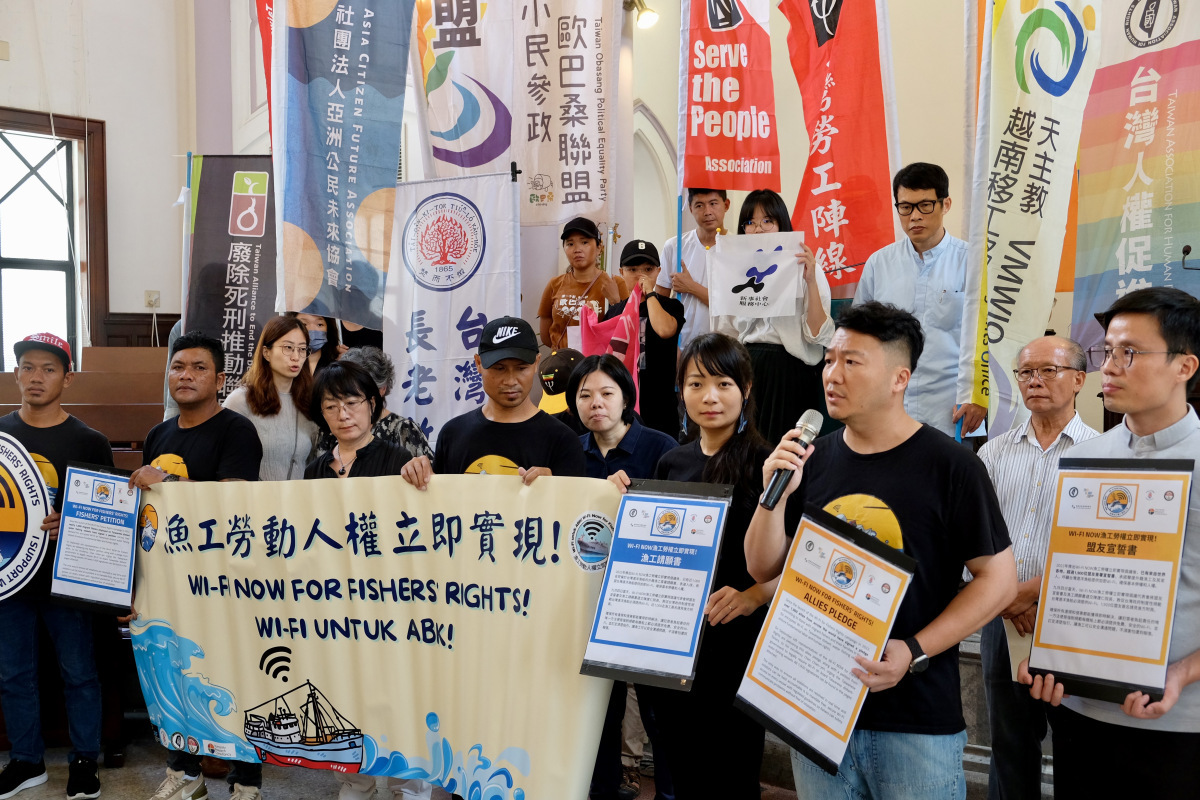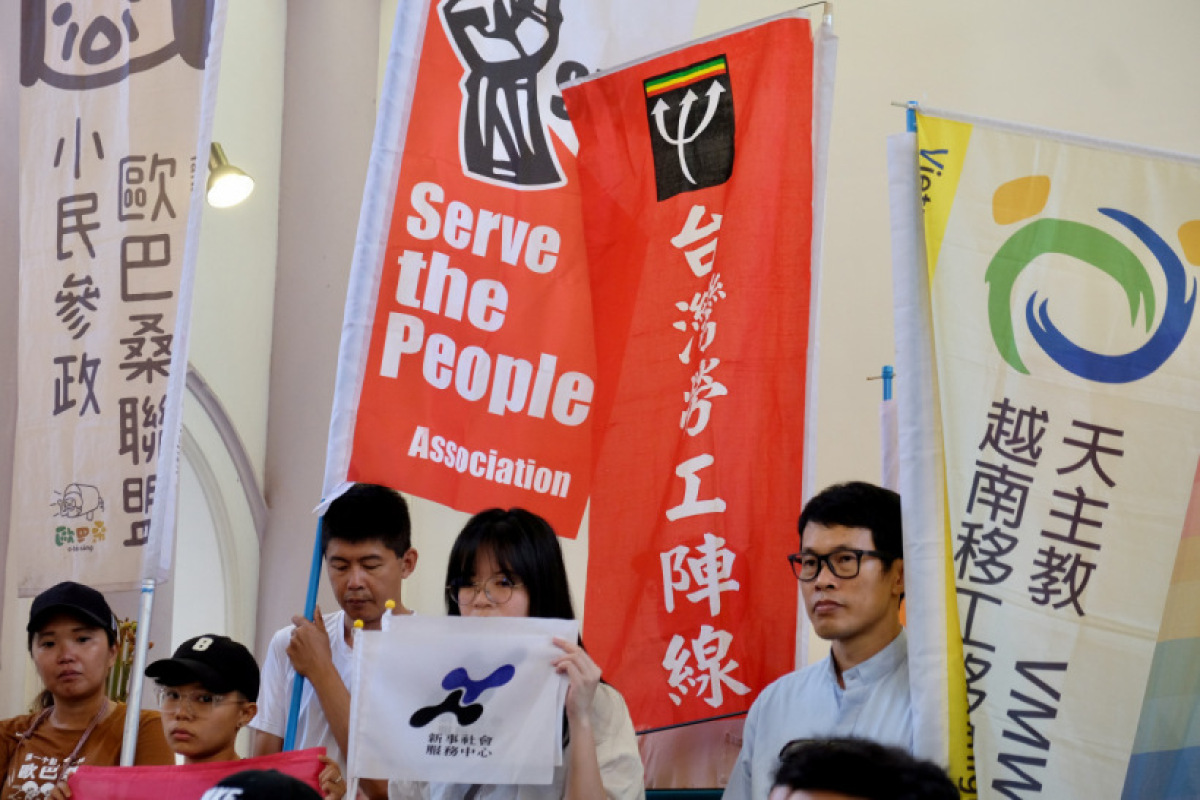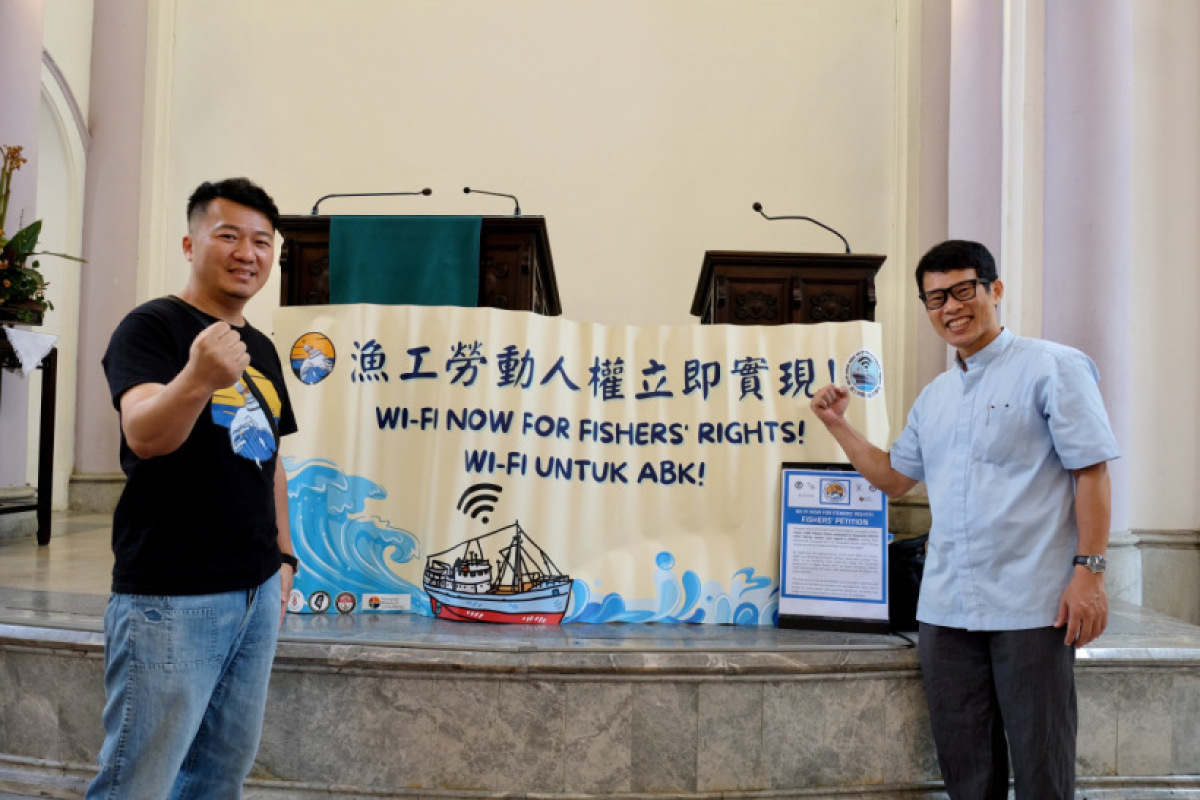
On September 1, 2023, Father Deng Li-Ren from Society of Jesuit and Supervisor Li Zheng-Xin from Rerum Novarum Center visited Chè-lâm Presbyterian Church in Taipei, along with partners advocating for the rights of foreign fishermen. They advocated for the right of foreign fishermen to communicate with the outside world while at sea. They hoped that through the joint efforts of non-governmental organizations, the Taiwanese government would address the challenges and needs of foreign fishermen at sea and uphold their human rights.

Foreign fishermen choose to work abroad to improve their family's livelihoods and achieve life goals; it is their choice. Allowing them to work on fishing vessels is also the choice of shipowners because offshore operations require teamwork, and one person cannot do it alone. Fishermen provide labor, and shipowners provide wages; this mutual understanding forms the basis of their relationship. Through this approach, with the joint efforts of fishermen and shipowners, Taiwan's marine fishing industry has achieved remarkable success, gaining international recognition.
However, before fishermen board the vessels, brokers and shipowners often promise to take care of them while at sea. This care typically includes providing basic physiological needs, sometimes even four meals a day and limited rest time. However, shipowners tend to overlook the fact that fishermen are human beings, not tools or machines.
Fishermen have not only physiological needs but also psychological needs that require care. Machines on board can work with the addition of oil and can be repaired or replaced if they break down. With regular maintenance, their quality can be maintained. However, humans are not machines, and even machines require maintenance, let alone humans.
Human psychological needs require maintenance. However, shipowners consistently tell the outside world how they take care of foreign fishermen on board and assist them when they are ill. Unfortunately, this "care" often revolves around their basic physiological needs, completely neglecting the psychological needs of fishermen.
In our frontline work, we frequently see many foreign fishermen experiencing tension or even ruptures in their relationships with their families due to the unique working conditions at sea.
Fishermen sometimes only find out about a parent's or child's death after they have returned to shore, which may be several months later. Marital relationships break down, and sometimes it takes several months ashore to reconnect once more, making it impossible to maintain a marital relationship.
Family members or children falling ill without the fishermen's knowledge is another common occurrence. By the time they find out, it could be months later, leading to a deep sense of guilt.
If they could know about these situations in real-time, they could at least offer prayers or blessings through their faith.
Just two weeks ago, a Filipino fisherman in Qianzhen Fishing Harbor committed suicide by hanging himself on board due to a quarrel with his wife, a highly emotional act. Such incidents are prevalent but often suppressed by shipowners or intermediaries, and the media rarely reports them because they are attributed to individual behavior.
If fishermen could maintain contact with the outside world while at sea, they might have the opportunity to manage their marital relationships better and reduce the occurrence of suicide or feeling disconnected from their homeland.
From such problems, we can see that they result from the inability to communicate with the outside world while at sea. Therefore, we strongly demand the installation of Wi-Fi equipment on fishing vessels, allowing fishermen to have autonomous external communication, meeting their psychological needs.
However, when we requested the installation of Wi-Fi equipment, shipowners told us they were concerned that fishermen would receive negative messages, leading to emotional instability and emotional outbursts on board. They have consistently been reluctant to install Wi-Fi for fishermen or refused to do so under the pretext of these concerns. Requiring fishermen to handle their personal problems in a negative way without the support of communication is highly inhumane.
Taiwan's distant water fishing industry has gained worldwide recognition due to cost-cutting measures, and while it may have been challenging for some shipowners in the past, times have changed. Technology has advanced, and the costs of many technologies, such as the internet, have decreased. Human rights were once only a concern for captains, chief officers, and higher-level managers, but in today's changing times, everyone cares about their own human rights, not just Taiwanese citizens or senior managers.
Therefore, we strongly urge the Taiwanese government to legislate and regulate that all fishing vessels must be equipped with Wi-Fi devices, making it a mandatory inspection item. This will ensure that all maritime workers have the right to external communication. Caring for fishermen is not just a slogan; it should meet their actual needs and provide genuine assistance. Let's start with Wi-Fi!

For a long time, fishermen have been a group neglected by the outside world. Since 2017, Rerum Novarum Center has been reaching out to these brothers on the sea, providing not only care but also practical solutions to their difficulties, including regulations, wages, workplace accidents, medical care, changing employers, human trafficking, and more. We have gone deep into 24 fishing ports to resolve the challenges faced by foreign migrant fishermen. We have seen that due to language barriers, most fishermen are unaware of their rights and don't know how to seek help. They endure harsh working conditions, hard work, meager income, and are an unprotected group of people. We hope for your donation to deeply accompany them, allowing our service to take root and become guardians of foreign migrant fishermen. Please click 「我要捐款」(“I want to donate") or call (02) 2397-1933 #122. Thank you for your response and concern!